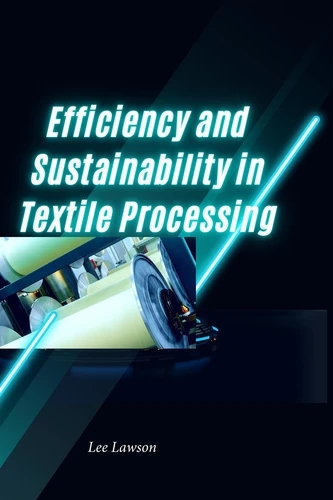Efficiency and Sustainability in Textile Processing
Par :Formats :
Disponible dans votre compte client Decitre ou Furet du Nord dès validation de votre commande. Le format ePub est :
- Compatible avec une lecture sur My Vivlio (smartphone, tablette, ordinateur)
- Compatible avec une lecture sur liseuses Vivlio
- Pour les liseuses autres que Vivlio, vous devez utiliser le logiciel Adobe Digital Edition. Non compatible avec la lecture sur les liseuses Kindle, Remarkable et Sony
 , qui est-ce ?
, qui est-ce ?Notre partenaire de plateforme de lecture numérique où vous retrouverez l'ensemble de vos ebooks gratuitement
Pour en savoir plus sur nos ebooks, consultez notre aide en ligne ici
- FormatePub
- ISBN8224694952
- EAN9798224694952
- Date de parution20/05/2024
- Protection num.pas de protection
- Infos supplémentairesepub
- ÉditeurVirtued Press
Résumé
In the textile industry, there is a growing need for sustainable and efficient production processes that minimize waste and reduce environmental impact. In "Efficiency and Sustainability in Textile Processing, " author Lee Lawson presents a comprehensive guide to achieving sustainability and efficiency in textile processing. The book provides an overview of the environmental impacts of textile processing and the importance of sustainable practices.
It then delves into the specifics of implementing efficient and sustainable processes, such as water conservation, energy efficiency, and cleaner production. Udhayamarthandan provides practical guidance on implementing sustainable practices in textile processing, including process optimization, waste reduction, and the use of renewable energy sources. The book also covers emerging technologies and best practices for sustainable textile production, such as digital printing, biodegradable fibers, and circular economy concepts.
Throughout the book, Udhayamarthandan emphasizes the importance of collaboration and stakeholder engagement in achieving sustainable textile production. The book includes case studies and examples of successful sustainable textile production initiatives, providing readers with valuable insights into practical implementation. This book is an essential resource for textile industry professionals, sustainability practitioners, and anyone interested in promoting sustainable and efficient textile processing.
It provides a roadmap for achieving sustainability and efficiency in textile processing, helping to minimize the industry's impact on the environment while maintaining high-quality production standards.
It then delves into the specifics of implementing efficient and sustainable processes, such as water conservation, energy efficiency, and cleaner production. Udhayamarthandan provides practical guidance on implementing sustainable practices in textile processing, including process optimization, waste reduction, and the use of renewable energy sources. The book also covers emerging technologies and best practices for sustainable textile production, such as digital printing, biodegradable fibers, and circular economy concepts.
Throughout the book, Udhayamarthandan emphasizes the importance of collaboration and stakeholder engagement in achieving sustainable textile production. The book includes case studies and examples of successful sustainable textile production initiatives, providing readers with valuable insights into practical implementation. This book is an essential resource for textile industry professionals, sustainability practitioners, and anyone interested in promoting sustainable and efficient textile processing.
It provides a roadmap for achieving sustainability and efficiency in textile processing, helping to minimize the industry's impact on the environment while maintaining high-quality production standards.
In the textile industry, there is a growing need for sustainable and efficient production processes that minimize waste and reduce environmental impact. In "Efficiency and Sustainability in Textile Processing, " author Lee Lawson presents a comprehensive guide to achieving sustainability and efficiency in textile processing. The book provides an overview of the environmental impacts of textile processing and the importance of sustainable practices.
It then delves into the specifics of implementing efficient and sustainable processes, such as water conservation, energy efficiency, and cleaner production. Udhayamarthandan provides practical guidance on implementing sustainable practices in textile processing, including process optimization, waste reduction, and the use of renewable energy sources. The book also covers emerging technologies and best practices for sustainable textile production, such as digital printing, biodegradable fibers, and circular economy concepts.
Throughout the book, Udhayamarthandan emphasizes the importance of collaboration and stakeholder engagement in achieving sustainable textile production. The book includes case studies and examples of successful sustainable textile production initiatives, providing readers with valuable insights into practical implementation. This book is an essential resource for textile industry professionals, sustainability practitioners, and anyone interested in promoting sustainable and efficient textile processing.
It provides a roadmap for achieving sustainability and efficiency in textile processing, helping to minimize the industry's impact on the environment while maintaining high-quality production standards.
It then delves into the specifics of implementing efficient and sustainable processes, such as water conservation, energy efficiency, and cleaner production. Udhayamarthandan provides practical guidance on implementing sustainable practices in textile processing, including process optimization, waste reduction, and the use of renewable energy sources. The book also covers emerging technologies and best practices for sustainable textile production, such as digital printing, biodegradable fibers, and circular economy concepts.
Throughout the book, Udhayamarthandan emphasizes the importance of collaboration and stakeholder engagement in achieving sustainable textile production. The book includes case studies and examples of successful sustainable textile production initiatives, providing readers with valuable insights into practical implementation. This book is an essential resource for textile industry professionals, sustainability practitioners, and anyone interested in promoting sustainable and efficient textile processing.
It provides a roadmap for achieving sustainability and efficiency in textile processing, helping to minimize the industry's impact on the environment while maintaining high-quality production standards.



